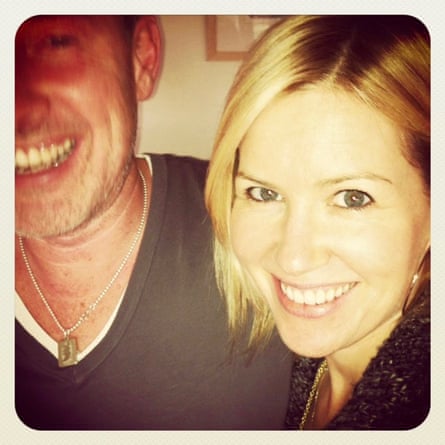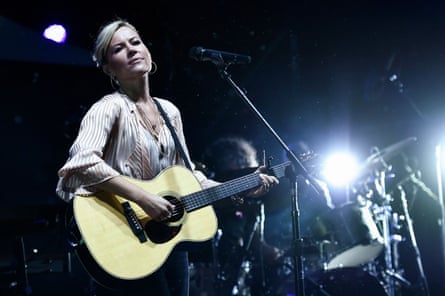Rollo Armstrong is clearly not a man used to giving interviews. He’s not suspicious or wary – quite the opposite, he’s very friendly – but he has a pad with him that I get the feeling contains notes for him to refer to during his answers. When I get my phone out to record our conversation, he produces his own. Not, he says sheepishly, because he doesn’t trust the press, but because he wants to listen back afterwards and see how he’s done. Until now, he shrugs, “there’s never been a need for me to say anything about anything, really”.
It’s hard not to applaud Armstrong’s skill at avoiding the limelight so completely that his Wikipedia page comes accompanied by a photo that looks like it was taken while he was still at university. He is, after all, a member of a band who, at the last count, had sold something like 15m records worldwide: Faithless, whose supercharged, stadium-packing take on late 90s club music, most notably trance and what used to be called epic house, has a claim to presage the rise of EDM, of which more later.
If you factor in the albums he helped his sister, Dido, make – the first two of which are among the biggest-selling in UK chart history – the total goes up to something like 50m. But the closest he ever got to appearing on stage with Faithless was manning the mixing desk at their first gig. “Well, I can’t play an instrument,” he says with a frown, which never stopped other dance producers from prodding at an unplugged synth while a backing track plays – and basking in the adulation of their fans.
Nor did he ever feel like doing the obvious thing and using the success of the huge hits he co-wrote with his sister – Here With Me, White Flag, Life For Rent – as an opportunity to start a career as the kind of blue-chip songwriter for hire that currently dominates pop. “That’s one thing I’ve never done and will never do,” he shudders, as if I’d just suggested he use the success of Dido’s hit singles as an opportunity to plunge his head in a bucket of sick.
Indeed, he notes, he wouldn’t be here today had he not made a solo album, albeit one that features his sister and most of Faithless – The Last Summer, under the name R Plus. And he wouldn’t have made a solo album had he not contracted lung cancer a couple of years ago. He didn’t realise he was ill until his wife bought him a health check for his 50th birthday, which unearthed a tumour requiring an operation “where they cut open my ribs and cut loads of nerves and stuff”. After the operation, he suffered from thoracotomy syndrome “where it feels like your nerves are on fire inside of you, they won’t meld together. It’s just horrible.”
He’s now “fully cured so no sympathy needed”, but spent his recuperation “going back to stuff I loved – books, films, albums, and when you hear excellence or read excellence, it makes you want to raise your own bar”. Prior to his illness, he’d been living in a kind of semi-retirement, Faithless having last made an album nine years ago. “But in a very cliched banal way,” he says, “cancer does make you slightly re-evaluate your life. I thought once I get back – if I get back – I want a little purple patch, a bit like…” He searches for a comparison and laughs. “Philip Roth.”
The result, The Last Summer, is an unashamedly sepia-tinted and sunlit album inspired by holidays he spent in his teens and early 20s in Greece and Ibiza. It sounds not unlike the strain of electronica that got bracketed as chill-out at the turn of the millennium – Air, Röyksopp, Moby’s Play – which means it fits perfectly with a curious current trend for dance music nostalgia. You can’t move at the moment for orchestras sawing their way through 90s dance hits, Faithless’s Insomnia invariably among them, for the edification of middle-aged former ravers.
It’s not the first time that Armstrong has seemed like a canny operator with an intuitive understanding of what a certain audience wants. At least one of the reasons for the vast success of Dido’s breakbeat-y easy listening in the early 2000s was that it chimed with the same generation of clubbers’ inevitable retreat from drugs and the dancefloor into domesticity – although, to hear Armstrong tell it, his entire career has been a series of happy accidents. He concedes that he “has the kind of taste that a lot of people seem to have” but everything else, all 50m albums of it, has been a matter of good fortune and providence.

He was brought up in a bohemian, literary north London household where TV was banned – a rule Dido tells me was so ferociously policed that when the siblings tried to smuggle a portable TV into their bedroom, their mother threw it out of the window. This clearly left its mark: his children are called Dalloway and Larkin and he mentions an abiding love of Jane Austen.
Armstrong fell into producing after meeting Rob Dougan – later the author of the inescapable Elgar-sampling chill-out track Clubbed to Death – at a party while travelling in Australia. The pair cornered an English producer at another party, who agreed to get them studio time provided they worked with his girlfriend, a model with ambitions to sing. “Good for him, he quickly realised she couldn’t sing at all, but he got us signed to a label over there with another singer. We got an advance. Then I got sick of Australia, came home with the money and bought a sampler.”
When a friend offered him £300 to produce a single by a singer called Felix, the result – 1992’s Don’t You Want Me – went to No 1 across Europe and kickstarted Armstrong’s 90s career as a producer of poppy, slightly camp house singles. “It was just luck, pure luck,” he says. So, he says, was Faithless, a band who look on the surface to have been the product of some very smart thinking: if mainstream 90s club music was getting increasingly epic and bombastic in tone, why wouldn’t a band playing something similar work as a huge live attraction?
In the mid-1990s, the band released Insomnia and Maxi Jazz, Faithless’s rapper, kept saying he wanted to be on stage. “He was saying, ‘When are we going to perform this?’ It was like, ‘Well, we won’t.’ But Insomnia was starting to be a hit in Norway, so they said, ‘Could you come over?’ Then it was climbing the charts in Germany. ‘Could you come and do a gig there?’ The record went ballistic – and it got to the stage where we were headlining a Mercedes factory in Germany with the Fugees. That happened in the space of two to three months. It was totally not planned.”

Perhaps there is something to Armstrong’s description of himself as someone who’s effectively blundered into vast success. Dido says that the two of them had always made music together – she sang on the first Faithless album after Armstrong offered to pay for her services with a takeaway curry – and that she knew all along that “he was the best producer to do what I wanted to do”. She only agreed to make her recent comeback album Still On My Mind – another Top 3 hit – on condition that he work with her.
Nevertheless, she says, he initially completely missed her potential as a solo artist. “I remember playing Rollo Here With Me. He took it into his record company, played it to them, and went: ‘We need to find someone like this!’ They were like: ‘Rollo, you’re so weird. Why don’t we just sign your sister?’ ‘No, no, we should just find someone else like her.’ I think it’s that sibling thing – because it’s someone you know, you can’t see it, you don’t spot it.”
There is talk of Faithless making a new album. They’d release it into a pop landscape that they appear to have influenced, albeit unwittingly. There really doesn’t seem that huge a distance between the cavernous synthesised string riff of Insomnia and the sound of EDM, the turbocharged variant on dance music that unexpectedly swept America over the last decade. Certainly, a lot of EDM’s most celebrated practitioners – Tiesto, Avicii, Axwell of Swedish House Mafia – queued up to work with their tracks on the 2015 remix album Faithless 2.0.
But, perhaps inevitably, Armstrong doesn’t really see it like that. “Funnily enough, that whole period was probably the most fallow of my whole career. There were some great records made in the time of Avicii, but I love music that’s euphoric but a little yearning. You get that through using soft sounds in a big way. I just find that gets closer to some kind of emotional truth. The second thing is that it was all about tension and release. I’m a dancer not a DJ, so I like it when it’s repetitive beats. The breakdown is the payoff for getting really lost in the beats. It being America, they’ve just sacked off the repetitive bits, it all became about the payoff, 100%. Not in a dick way, but I don’t want to make music like that. It seemed so manipulative, very Pavlovian.”
Before he heads off into London, anonymous as usual, to meet his wife, he says he thinks The Last Summer has the kind of quality he’s looking for. “It’s golden and it’s bittersweet. I think there’s a certain truth to that. You know, it sounds ridiculous, but I genuinely hope I’ve spent my time making music that has some kind of emotional weight for people.” He laughs. “But then you hear that the most played song at funerals is Flying Without Wings by Westlife, which was written by a committee for people who didn’t really care what they were singing, and you think, ‘Really?’”
The Last Summer by R Plus is out on 11 October on Loaded Records.

Comments (…)
Sign in or create your Guardian account to join the discussion